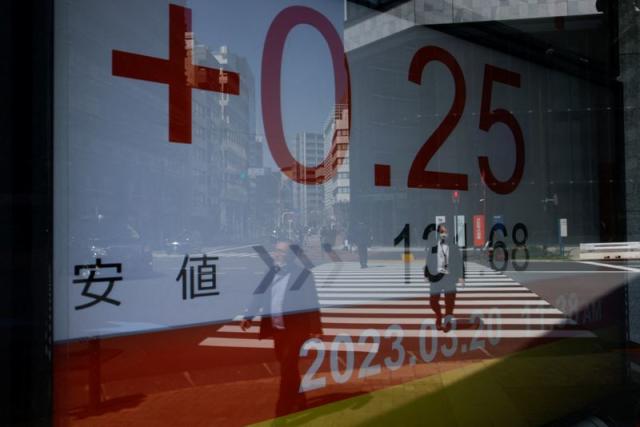Asian stocks rose on Thursday, as traders figured a small upside surprise for U.S. inflation was unlikely to push up interest rates, while the euro was firm leading in to a European Central Bank meeting where expectations lean toward a rate hike.
MSCI's broadest index of Asia-Pacific shares outside Japan (.MIAPJ0000PUS) rose 0.6% for its best session in a week and a half. Tokyo's Nikkei (.N225) rose 1.4% to a one-week high. India's BSE Sensex (.BSESN) rose 0.5% to a fresh record peak.
S&P 500 futures rose 0.3%, while FTSE futures and European futures each rose 0.2%.
Wednesday data showed higher fuel prices had lifted headline U.S. consumer prices by the most in 14 months in August for an annual rate of 3.7%, which was a touch above expectations. Core inflation slowed to an annual 4.3%, as expected.
Treasury yields initially spiked higher, as did the U.S. dollar, before both retraced the moves.
Benchmark 10-year Treasury yields finished the New York session a bit more than a basis point (bp) lower and fell by a further two bps in Asia to 4.23%. Two-year yields spiked above 5%, but were last at 4.96%.
"I think markets are largely prepared for a rebound in inflation, given rapidly rising global energy prices," said Glenn Yin, head of research and analysis at AETOS Capital Group in Melbourne.
"It does feel like the highly anticipated Fed pause next week is outweighing the fact that inflation has risen at the fastest pace in more than a year."
Fed funds futures hardly budged on the inflation data, and imply nearly no chance of a rate hike next week, and about a 45% chance of another hike by year's end.
Thursday's European Central Bank meeting is next on the horizon, with markets pricing about a 65% chance of a hike that takes Europe's key interest rate to a record peak.
However analysts see risks to the downside for the common currency - last marginally firmer at $1.0747.
"Either the ECB surprises by not hiking, or they deliver a very dovish late cycle hike," said Brent Donnelly at Spectra Markets. "Either way, it's not bullish euro," he said.
Around Asia, stock market moves were mostly modest, with the Hang Seng (.HSI) and mainland Chinese markets (.SSEC)(.CSI300) trading either side of flat, with China electric vehicle shares a drag after the European Commission announced a probe into subsidies.
In foreign exchange markets, the dollar was slightly sold, and the Australian dollar was boosted by a surge in employment in August. It was last about 0.2% higher at $0.6435, though interest rate expectations were little changed.
The New Zealand dollar was also firmer at $0.5929, while the dollar slipped about 0.2% to buy 147.13 yen .
The yen has mostly handed back gains made after Bank of Japan Governor Kazuo Ueda hinted at the conditions for an end to negative short-term rates, as traders figure on any exit being slow and the gap with U.S. rates remaining wide.
China's central bank has asked some of the country's biggest lenders to refrain from immediately squaring their foreign exchange positions in the market, and to run open positions for a while in order to alleviate downside pressure on the yuan, two sources with knowledge the matter .
In the U.S. session on Thursday chip designer Arm Holdings(ARM.O) begins trading, after a $51-a-share float gave it a valuation of $54.5 billion. Retail sales data are also due.
In commodity markets oil is on a tear as Saudi Arabia and Russia extend production cuts to the end of 2023. Brent crude futures are up 30% in three months to $92.32 a barrel.
"The market remains beholden to Saudi Arabia's oil policy," said analysts at ANZ Bank, who said if cuts were extended into the first half of next year, Brent prices could hit $100.










